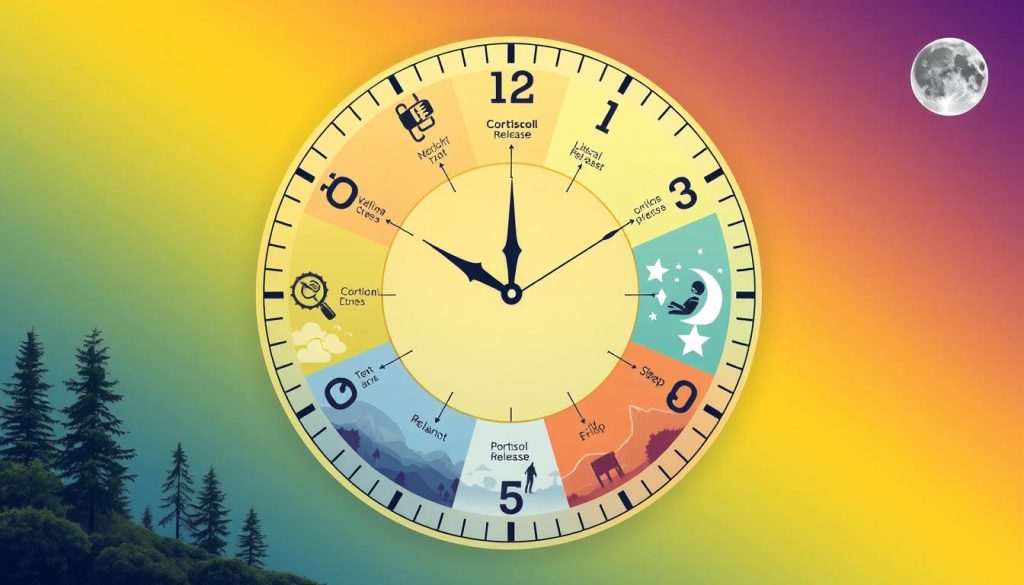Learning about my circadian rhythm is key to managing stress. This natural clock controls my sleep and health. It helps me live a healthier life.
When I align my day with my body’s rhythms, I feel less stressed. But, when my rhythm gets disrupted, stress goes up. By focusing on my natural schedule, I can lead a more balanced life.
Understanding Circadian Rhythms and Their Impact on Stress
Circadian rhythms control the 24-hour cycles that affect my body and mind. These biological clocks help regulate hormone release, eating, and sleep. They also affect my energy and mood. Knowing how they work helps me manage stress better.
What Are Circadian Rhythms?
The brain’s hypothalamus controls the circadian cycle, responding to light. Natural light helps keep my biological clock in sync. This is key for knowing when to be awake or sleep. Disruptions can affect hormone levels, like cortisol, which is important for stress.
How Disruptions Affect My Stress Levels
Many things can mess with my circadian rhythms. Irregular work hours, bad sleep schedules, and too much artificial light can throw off my clock. This can raise cortisol levels and make me more stressed.
| Disruption Factor | Impact on Circadian Rhythm | Possible Stress Outcomes |
|---|---|---|
| Irregular Work Hours | Alters sleep-wake cycle | Increased anxiety and fatigue |
| Inconsistent Sleep Schedule | Delays hormone release | Sleep disorders, irritability |
| Exposure to Artificial Light | Interferes with melatonin production | Difficulty concentrating, higher stress |
Understanding my body’s natural rhythms helps me plan my day better. This reduces stress and improves my overall health.

The Connection Between Sleep and Stress Management
It’s important to understand how sleep and stress are connected. Good sleep helps improve my mood and thinking skills. It also helps me deal with daily stress better.
Importance of Quality Sleep
Quality sleep is key to managing stress. When I get enough sleep, I feel better emotionally and think clearer. To improve my sleep, I follow these tips:
- Go to bed and wake up at the same time every day.
- Make my bedroom quiet and dark.
- Stay away from screens before bed to avoid blue light.
The Impact of Sleep Disorders
Sleep disorders can make stress worse. Problems like insomnia and sleep apnea make it hard to sleep well. This leads to feeling irritable and having trouble focusing. To fix this, I need to:
- See a doctor to find out what’s wrong and get help.
- Try cognitive behavioral therapy for insomnia to change my sleep habits.
- Make healthy lifestyle choices like exercising and eating right to help sleep better.

Creating a Daily Routine to Sync My Circadian Rhythm
Creating a daily routine that matches my circadian rhythm boosts my well-being and stress management. By adding specific morning and evening habits, I can better sync with my body’s natural rhythm. Here are some strategies I will use.
Morning and Evening Routines
Starting my day at the same time every day is key. Waking up early lets me do activities like stretching or meditating. These activities wake up my body and mind for the day.
In the evening, I focus on relaxing to get ready for sleep. Reading or gentle yoga are my calming evening rituals. They help me relax and make bedtime easier.
Incorporating Natural Light
Natural light is crucial for my circadian rhythm. Being outside during the day tells my body it’s time to be awake. I enjoy activities like walking or having coffee outside.
In the evening, I use soft lighting to avoid harsh artificial light. This helps me feel calm and sets a clear day-night boundary. It’s important for managing stress.

| Time of Day | Activity | Purpose |
|---|---|---|
| Morning | Wake up at the same time | Promote circadian synchronization |
| Morning | Outdoor walk | Enhance natural light exposure |
| Evening | Perform relaxation exercises | Prepare for restful sleep |
| Evening | Minimize artificial light | Encourage winding down |
Circadian Rhythm and Stress Management: Effective Strategies
Adding stress relief activities to my daily routine helps me stay in sync with my body’s natural rhythms. These activities not only improve mindfulness but also align my body’s cycles with my daily life.
Stress-Relieving Activities
Using relaxation techniques in my day helps me feel better right away and in the long run. Here are some top activities I find helpful:
- Yoga: It mixes physical movement with deep breathing, leading to calmness and clear thinking.
- Meditation: Just a few minutes a day boosts mindfulness, keeping me steady through tough times.
- Deep Breathing Exercises: Focusing on my breath helps me relax and lowers body tension.
Technology and Relaxation
Technology can sometimes mess with my natural rhythm, but it can also help me relax. I use different tools to ease stress:
- Meditation Apps: Apps like Headspace or Calm lead me through calming exercises.
- Calming Music Playlists: Listening to soft music helps me relax, making it easier to start a calm evening.
- Blue-Light Filters: These on my devices cut down eye strain at night, helping me relax before sleep.
The Role of Diet in Supporting My Circadian Rhythm
Learning about diet’s effect on my circadian rhythm has been enlightening. Eating sleep-friendly foods improves my sleep quality. Foods like whole grains, fish, chicken, fruits, and veggies are excellent choices. They help my body stay in rhythm and promote relaxation.
Eating for Better Sleep
Meal timing is key for managing stress and well-being. Eating dinner a few hours before bed helps me sleep better. Eating nutrient-rich foods all day improves my mood and stress levels.
Hydration and Stress Relief
Drinking enough water is crucial for managing stress. It keeps my body and mind working well. I always carry a water bottle to remind me to drink often. Good hydration helps detoxify and reduces stress, improving my health and rhythm.

